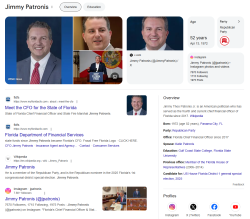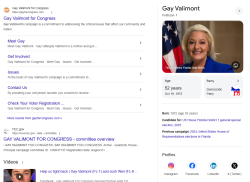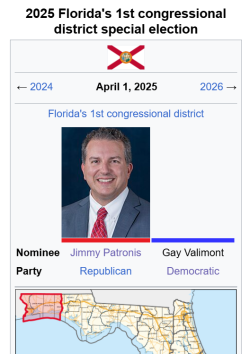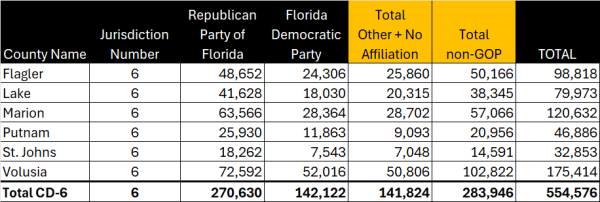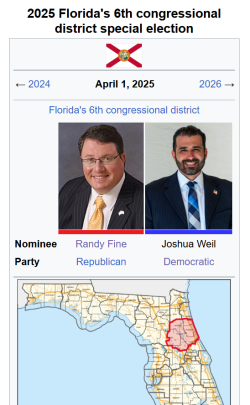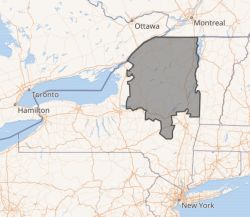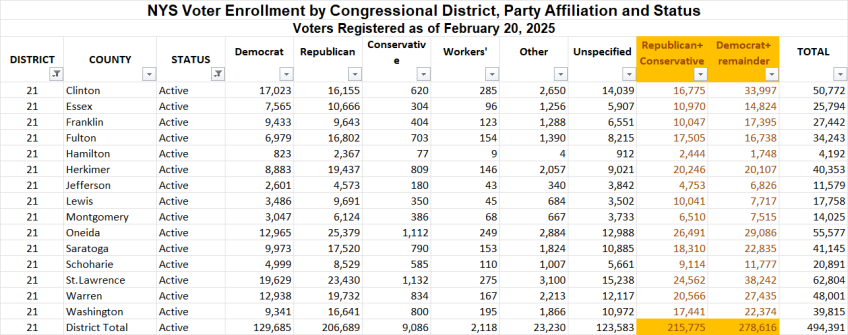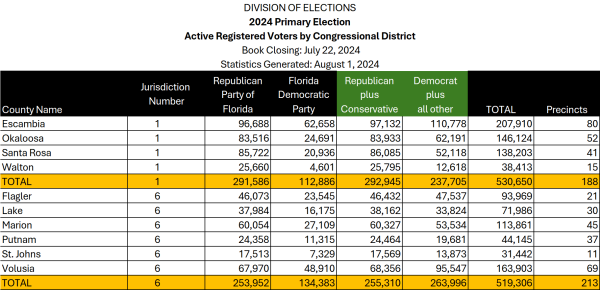During the course of our analysis, two Democratic House members passed away, increasing the GOP advantage in the House until those seats are filled again. Prior, at 218 (R) - 215 (D), Stefanik's seat open after confirmation as UN ambassador and Democrats taking two in Florida would have deadlocked the House at 217 - 217. Stefanik's seat then going to Democrats would then swing the House to Democratic control. Anticipating this possibility, President Trump withdrew her nomination on March 28th, the Thursday before the Florida elections. We have retained all our initial analysis including Stefanik's district and added a comparison to the 2024 Florida primaries.
Florida's 1st congressional district special election
Jimmy Patronis (R), Chief Financial Officer of Florida, is pitted against Gay Valimont (D), a mother and political activist who is running again after losing to Matt Gaetz in 2024. Gaetz vacated his seat when he was nominated for Attorney General.
Read about the race
Florida's CD-1 is Matt Gaetz's former district. The district leans heavily Republican, with a Cook Political Partisan Voting Index of R+22, and is Florida's most Republican district. Indeed, Cook projects that Republicans should have no problem holding on in the special elections for all three formerly Republican seats, two in Florida, one in New York.1
An examination of voter registrations for the CD-1 special election2 tells a tale of two Dickensian cities:
One where Republicans massively outnumber Democrats, 13:5, for the special election. The other, where Republicans still outnumber the sum total of Democrats, non-aligned voters, and "other party" voters — but by a much closer 5:4.
A Republican lock?
Matt Gaetz won his 2024 reelection with 66% of the vote.3 And if we look at only Republicans versus Democrats registered for the special election, that tracks party-line expectations; adding up Republicans and Democrats, Republicans represent 72% of that total, on the face of it, a seemingly insurmountable majority.
But is it realistic for Democrats to throw in the towel? Not yet. A large number of voters registered as other than Republican or Democrat. And voters are motivated! 415,088 total votes were cast in the 2024 House election pitting Matt Gaetz against Gay Valimont, whereas 562,969 registered for the special election.
150,000 more voters have registered to vote in the April 1st special election than voted in the 2024 House race.
It's time to get out the vote!
Unfortunate Democratic anonymity
In the race of Jimmy Patronis (R) versus Gay Valimont (D), voters Google searching Patronis find his Twitter ("X") account, Instagram account, current office-holder information ("CFO of Florida"), and a fulsome Wikipedia biography. Links in this article are citations, not endorsements of content. Meanwhile, the same voter searching for information on Valimont returns only campaign-related materials and campaign social media accounts. No visibility to Valimont apart from the campaign.
Similarly, looking up the special election on Wikipedia yields an article including a head shot and biography link for Patronis versus empty space captioned with "Gay Valimont." Incidentally, this means there was nothing on Wikpedia about Valimont when she ran against Gaetz in 2024, either. This is not acceptable. Moreover, after a long list of endorsements of Patronis, there is not a single mention of an endorsement of Valimont.
Question: what are the odds of a Democratic win?
Republicans outnumber "the rest of the field" by 309,272 to 253,697. However, recently polled Floridian Republicans disapprove of Trump by 45%.4 What are the implications? At 100% participation:
- If 65% of Republicans and 30% of non-Republicans vote for Patronis, that totals 277,136 votes.
- Correspondingly, 35% of Republicans and 70% of non-Republicans voting for Valimont totals 285,833 votes.
- Valimont wins by a razor thin 8,697 votes, or by 1.5% of the votes cast.
Answer: not insurmountable.
There is room for hope, as Pensacolans take to the street to protest Elon and Trump.
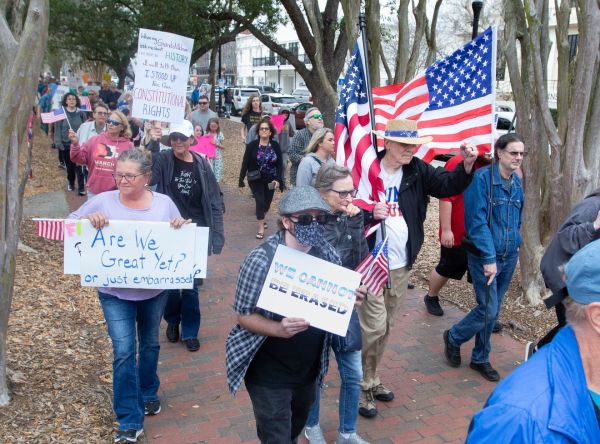
Finally, an opinion appearing in USA TODAY, via Yahoo! News:6
Trump is trashing the Constitution. He should focus on inflation instead.
Trump is incompetent and trashing our Constitution. Tariffs will raise prices of everything. Attacking the federal government will harm our nation.
He should focus on inflation and lowering food prices as promised and stop deflecting with issues that are implemented for perceived slights. Get Musk out. He was not elected, nor was he vetted by Congress.
I feel the Project 2025 white nationalists using Trump will destroy our democratic republic.
— [redacted], Pensacola, Florida
Gay Valimont's web site is gayforcongress.com/
Florida's 6th congressional district special election
Randy Fine (R), current Florida State Senate District 19 representative, is running against Joshua Weil (D), a teacher, progressive, and transplanted New Yorker. James Stockton, a pastor and activist who lost to Michael Waltz in 2024, did not participate for the special election. Waltz gave up his seat when he was appointed National Security Advisor.
Read about the race
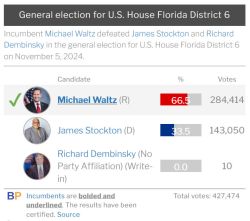
Unlike Florida's CD-1 election, the 2024 Democratic candidate did not returned to relitigate the race. Joshua Weil, won the multi-candidate special election Democratic primary and is running in the 6th District special election for the Democrats. To find out more about him, you can read Weil's Ballotpedia survey response.
Randy Fine, a Republican businessman and current Florida State Senate District 19 representative, is running after winning his special election primary with 83% of the vote. Fine is an active opponent of union rights, DEI efforts including in the awarding of state contracts, and Palestinian rights.
Follow are the voter registrations totals8 for the CD-6 special election:
More Democratic anonymity
Similar to the CD-1 special election, 2025 Florida's 6th congressional district special election Wikipedia is of little use regarding Weil, the Democratic candidate. As with CD-1, no biographical information is provided, no endorsements are listed as compared to the Republican candidate, prominently featuring President Trump. Nor is there a Wikipedia biography.
Another Republican lock?
Walz won with two thirds of the vote in 2024. As with CD-1, a seemingly insurmountable margin. Similarly to CD-1, more voters (554,576) have registered for the special election than voted (427,474) in 2024.
127,000 more voters have registered to vote in the April 1st special election than voted in the 2024 House race.
Question: what are the odds of a Democratic win?
Given rising Republican dissatisfaction with Trump's and Musk's DOGE agenda, the odds are not insurmountable. If, for example, we apply at 30%:70% split in the vote for both candidates at 100% participation:
- If 70% of Republicans and 30% of non-Republicans vote for Fine, that totals 274,625 votes.
- Correspondingly, 30% of Republicans and 70% of non-Republicans voting for Weil totals 279,951 votes.
- Weil wins by a razor thin 5,326 votes, just under 1% of the votes cast.
It's also worth mentioning that Weil has been able to raise a "shocking" amount of money in his campaign.
Answer: again, not insurmountable. The people of Miami have been taking to the streets!

Josh Weil's website is at joshweil.us/
New York's 21st congressional district special election
A special election was anticipated for April 1st for Elise Stefanik's seat after she was nominated for UN Ambassador. Her nomination was delayed, then withdrawn five days before the Florida special elections. She retains her seat.
Read about the race
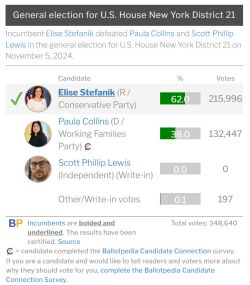
Some might find it confusing that any area of New York State might elect a Republican to office. In truth, the state is a dichotomy consisting of contrasting and competing "downstate" predominantly Democratic and "upstate" predominantly Republican counties, districts, interests, and priorities.
New York's CD-21 encompasses a massive swath of upstate New York, 16,400 square miles11, a full 30% of the state. Elise Stefanik won her 2024 election with a commanding 62% of the vote.
Unlike Florida, where the candidates were chosen in special primaries, the NY District 21 Democratic chairs have selected Blake Gendebien, a dairy farmer, as special election candidate. Perhaps anticipating (our speculation) a possible GOP voter insurrection and swing of the district to Democrat, the April 1st special election for this district has been delayed because the vote to confirm Stefanik as UN Ambassador (only then relinquishing her House seat) is now scheduled for April 2nd. In the meantime, state Democrats considered keeping Stefanik's seat open as long as possible to decrease the House Republican count by one. However, a bill to delay the special election into November failed.
Republicans will launch their formal selection process once Stefanik's seat is open. Without a primary, the GOP candidate will be selected by the 15 county Republic chairs. Stefanik is likely to have a say in her successor.12
District voter profile
We are not aware of any special requirements to register for a special election in New York State. If we look at the active registered voter breakdown for CD-21 as of February 202513:
On the face of it, NYS CD-21 could appear to be the easiest district to win were voters to be motivated in the desired (non-Republican) direction. However, that would require all undeclared-party voters, a bloc nearly as large as the Democrats, to unite with the Democrats. We cannot anticipate how people will vote who are active, yet have not declared a party alliance. Nevertheless, that the district shows 494,391 active voters versus 348,640 voting in 2024 — a 71% turnout, indicates there is wiggle room for a larger turnout. (There are 517,073 registered voters in CD-21, meaning a third of CD-21 total voters did not vote in 2024.)
Elise Stefanik's nomination for UN Ambassador was withdrawn March 27, 2025 to ensure Republicans keep their House majority. We have retained the above analysis for historical reference.
Compared to the Florida 2024 primaries
At the end of the day, the special elections boil down to three questions. First, are voters motivated? Following are the "active" registration totals for Florida's CD-1 and CD-2 in the 2024 primary:14
Registrations are up across the board for both affiliated and unaffiliated voters.
Second, will GOP voters express their dissatisfaction or circle their wagons around Musk-Trump?
Ultimately, are enough voters angry enough to elect Democrats? Our numbers suggest it's possible.
Update on House seats
Earlier this year, it appeared Democrats had a chance to swing the House this year, with three seats up, or anticipated to be up, in special elections: two in Florida and one anticipated in New York after Elise Stefanik's confirmation as UN ambassador. Circumstances have changed since.
As of today, Republicans hold a majority of 218 seats, Democrats a minority of 213, with four seats vacant, impacted by the recent deaths of two Democratic members this month. Those vacant seats are:
- Florida CD-1: Matt Gaetz (R) resigned on November 13, 2024, after an announcement by President-elect Donald Trump of his intention to nominate Gaetz to the office of United States Attorney General, and the House ethics committee seeking to release their report on Matt Gaetz in two days at the time of his resignation. Gaetz chose not to assume his seat on January 3, 2025, to which he had been elected. Special election scheduled for April 1, 2025.
- Florida 6: Michael Waltz (R) resigned on January 20, 2025 to become National Security Advisor to President Donald Trump. Special election scheduled for April 1, 2025.
- Texas 18: Former Houston mayor and Representative Sylvester Turner (D) died on March 5th. Special election date not set.
- Arizona 7: Long-time Representative (2003-2025) Raúl Grijalva (D) died on March 13th. The special election will be held on September 23, 2025.
On the Thursday before the special election, President Trump withdrew Stefanik's nomination for UN Ambassador to preemptively insure Republicans do not lose her seat and the Republicans their House majority.
This loss of opportunity for Democrats makes it all the more imperative that they carry the Florida special elections to send the GOP a clear message of resistance to the Musk-Trump gutting of government agencies and services and to the decimation of the careers and lives of tens of thousands of dedicated public servants.
The challenge for Democrats
Rural and small business America is "working America." In their minds, Republicans have successfully defined Democrats as champions of fringe, not kitchen table, issues. Meanwhile, Democrats doggedly do the work to keep the country running and the people safe and secure.
- Republicans successfully message lies about what Democrats will do TO us and what Republicans will do FOR us — and then claim credit for what government accomplishes even when they voted against it.
- Democrats unsuccessfully message facts about what Republicans will do TO us and what Democrats have ALREADY done FOR us.
Democratic leadership and "strategists" must address the dumbing down and inattentiveness of today's electorate: that a lawn sign with four to six words is far more persuasive than discussing policy, or offering loan forgiveness, or lowering consumer interest rates, or providing first-time home-buyers with $25,000 in down payment assistance,....
What can I do?
Activism does not have to be exhausting. These tried and true suggestions hold true for any political campaign.
- Donate to campaigns, if you can.
- Spread the word on social media.
- Go to democrats.org to find additional ways to help for specific elections.
Updated: March 29, 2025 02:17 GMT


